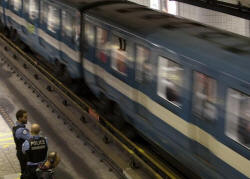|
Quebec pension fund ups
stakes in infrastructure test case
 Send a link to a friend
Send a link to a friend
 [September 19, 2016]
By Matt Scuffham [September 19, 2016]
By Matt Scuffham
TORONTO (Reuters) - Quebec's public
pension fund, the Caisse, is about to take on one of its toughest
investment challenges yet - helping the commuters of Montreal.
Keen to boost returns, Canada's second-biggest pension fund is
financing and overseeing the construction of a new 67 kilometer
(41.6 miles) public transit system in Montreal, the third largest
automated transportation system in the world behind those in Dubai
and Vancouver.
It will own and operate the track once it has been built.
The venture is a bold move by the Caisse - more familiar with bond
prices and rental yields than ticket fares and commuter habits - and
one fraught with risks.
Canada's biggest pension funds, such as the Caisse and the Canada
Pension Plan Investment Board, are among the world's biggest
infrastructure investors, having pioneered a strategy of directly
investing in the asset class as an alternative to low-yielding
government bonds and volatile equity markets. (Graphic: http://tmsnrt.rs/1SLRtfJ)
Senior fund sources told Reuters other funds see the Caisse's
efforts as a test case as they consider whether to finance major new
infrastructure projects planned by Canada's federal government.

The Caisse aims to get the first trains running by 2020, at which
point other investors and public authorities can start to assess how
successful the project was.
The federal government's C$120 billion ($91 billion) infrastructure
investment program is spread over a decade.
Unlike most private-public partnerships, which usually focus on
finished projects, the Montreal deal has the Caisse assuming all of
the construction and operational risk.
Such "greenfield" investments, potentially promise higher returns,
but the risks are greater too because of possible cost overruns,
delays and uncertain revenues.
The fund, which has C$255 billion in assets, is investing C$3
billion in the 24-station light rail system, which will connect
downtown Montreal with the city's Trudeau airport.
The federal and provincial governments are in talks to provide the
remaining C$2.5 billion required.
"The project has clear benefits for commuters and economic growth in
Quebec, but it will also generate returns for depositors," said
Audrey Cloutier, a spokeswoman for Quebec's Finance Minister Carlos
Leitao. "We feel it's a true win-win arrangement."
In return for taking the execution risk, fund sources say the Caisse
is proposing that it retains all the profits up to a
yet-to-be-agreed level, after which it will share the returns with
the provincial and federal governments. Taxpayers still risk losing
their initial investment if the project fails.
NO GUARANTEES
To mitigate construction risk, the Caisse plans to rely on
fixed-price contracts with hefty penalties for cost overruns, the
sources told Reuters.
The Caisse has not sought guarantees over future traffic demand from
the Quebec government and not asked it to make up any shortfall, the
sources said, since such a provision would have reduced Caisse's
anticipated returns.

David Caplan, who was Ontario's Infrastructure Minister between 2003
and 2008 says it might be too much risk for Caisse given how
difficult it is to predict transport usage.
"I'm skeptical," he told Reuters.
"If you forecast your demand too high then you'll just be
hemorrhaging money if the government isn't backstopping."
The Caisse said it had addressed the demand risk by asking
London-based traffic consultancy Steer Davies Gleave to undertake an
"exhaustive and detailed ridership study" due this fall. Steer
Davies Gleave declined to comment.
Canada's Prime Minister Justin Trudeau is courting the pension funds
to help stretch the taxpayer money in the government's
infrastructure plan.
[to top of second column] |

FILE PHOTO - Polices officers watch a train pass in a subway station
in Montreal, May 10, 2012. REUTERS/Olivier Jean

Infrastructure experts have identified public transit expansion in
Toronto, new subway and rail projects in Vancouver and flood
protection defenses in Calgary as possible priorities but the
government has yet to confirm its plans.
Infrastructure Minister Amarjeet Sohi said that the Caisse model
could be replicated if it proves successful.
"I think those are the kind of ideas we need to talk about and we
need to explore," he told Reuters in an interview.
The Caisse has a history of infrastructure investments stretching
back to 1999. It was the lead investor in the construction and
operation of a rapid-rail link between downtown Vancouver and its
airport that was completed on schedule and on budget in 2009.
Overall, the Caisse reported average returns of 9.1 percent in 2015,
compared with a 5.4 percent return from Canadian pension funds in
general, according to RBC Investor & Treasury Services.
People familiar with the matter told Reuters the Caisse is expecting
annual returns of 10 to 15 percent from the Montreal project
compared to the 6 to 8 percent that industry executives say
investment in pre-built assets normally brings.
A Caisse spokesman said the fund's "objective is to achieve a
commercial return, comparable to that of similar projects in the
world".
A FAIR FARE
Canada's pension funds are fiercely protective of their independence
and investing with the government on construction projects could
expose them to political interference and greater reputation risk if
things go wrong.
It is less problematic for Caisse, because in contrast to other
funds its mandate includes supporting the Quebec economy, but there
is still potential for political friction.

At the first environmental hearing for the project last month,
hundreds of Montrealers aired their concerns about fare costs and
the environmental impact. Some residents also complained that it
unfairly focuses on one side of the city.
The Caisse has said it will work with a new government agency set up
to standardize public transit fares in Montreal, to set prices and
will provide details in the spring.
"I think the risk profile on that investment is very, very high,"
said Leo de Bever, former chief executive of the Alberta Investment
Management Corporation and a pioneer of the Canadian funds' strategy
of investing in infrastructure.
The obvious risk, he said, was possible pressure from local
politicians to lower the fares.
De Bever said pension funds should develop the expertise in "greenfield"
investments to boost returns, but warned that there would be
casualties.
"Some of them could lose money."
($1 = 1.3199 Canadian dollars)
(Reporting by Matt Scuffham; Editing by Carmel Crimmins and Tomasz
Janowski)
[© 2016 Thomson Reuters. All rights
reserved.] Copyright 2016 Reuters. All rights reserved. This material may not be published,
broadcast, rewritten or redistributed.
 |